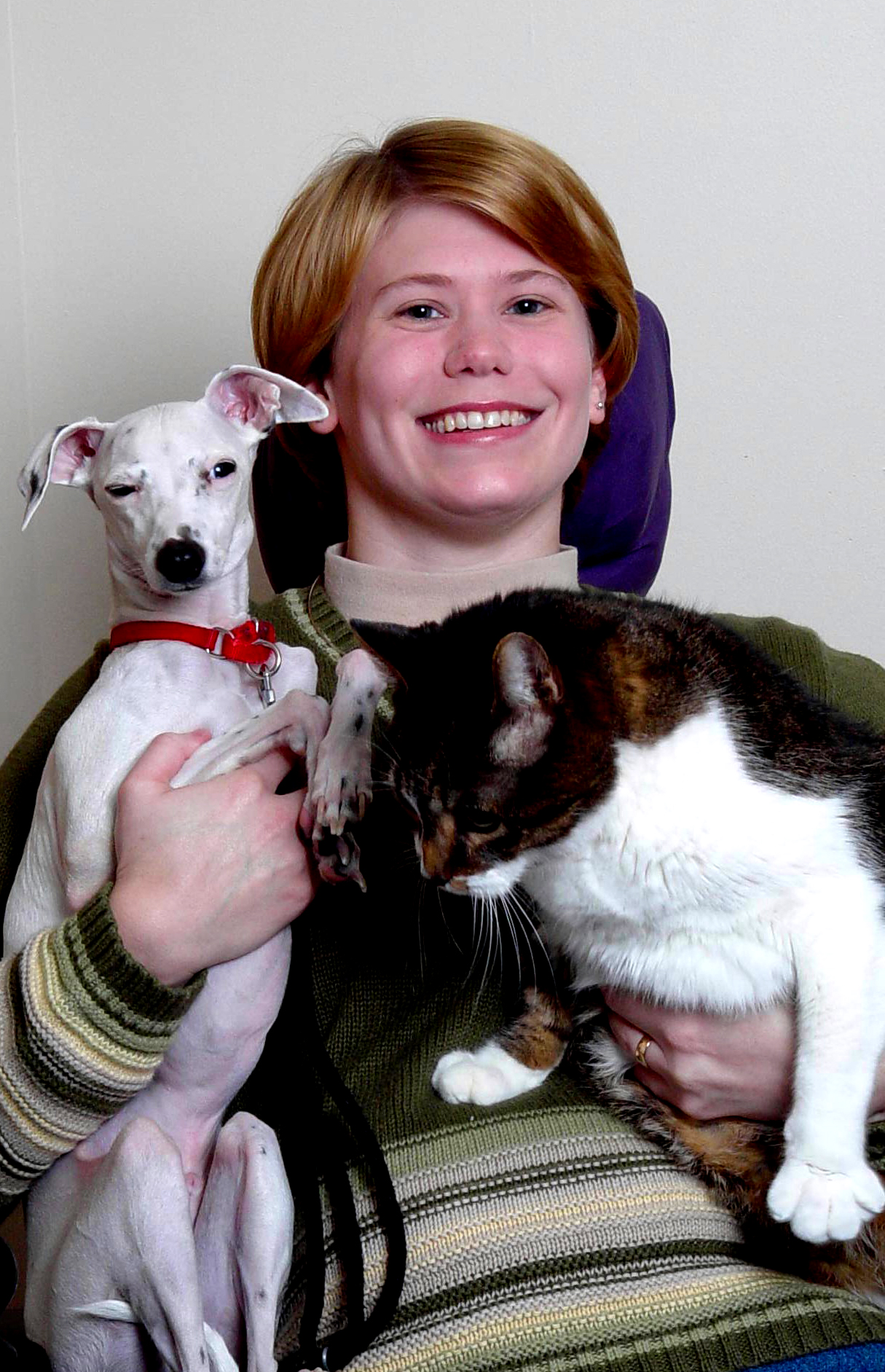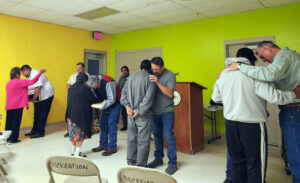
URBANDALE, Iowa (BP)–Many people are involved in missions in Iowa, but one particular person does it on a regular basis without leaving her home. Although she faces the mounting challenge of Lou Gehrig’s disease, Jenifer Barrentine desperately wants to be involved in missions work.
Barrentine, 27, helps coordinate mission projects with the help of a computer and a telephone. Her mother, Joan, helps pick up the workload when her daughter’s strength is failing.
“I think I have a very unique opportunity to share Christ with some people who would not be open to hearing about Christ if I were not in this wheelchair or in this situation,” Barrentine said. “Some people are curious about the illness when we talk on the phone or when I am out in the public with my motorized wheelchair. They will open up to me in a way that they probably would not do otherwise.
“One day I was in a store, buying a birthday present, and a salesclerk took probably a half-hour visiting with me and opening up. I had a chance to share my testimony of knowing Christ, and it seemed to really touch her.”
CIRCUMSTANCES CHANGE
The daughter of Baptist Convention of Iowa executive director Jimmy Barrentine, she said circumstances occur in life that can change things dramatically for some people. When that happens, people have choices to make, and one of those choices is how they will react to those changes. A Christ-like spirit and a positive attitude make a big difference between despair and making the best of a tragic situation, she said.
Barrentine, of Urbandale, Iowa, has faced a debilitating health condition for more than three years with grace and courage. She has a fervent desire to serve her Lord as she does volunteer work for the Baptist Convention of Iowa on the missions team.
She helps coordinate project requests for the Tennessee-Iowa Missions Partnership, a relationship between the Tennessee Baptist Convention and the Baptist Convention of Iowa in which churches volunteer to assist other churches with building projects, Vacation Bible Schools, prayerwalks and church starting efforts. Her role is to keep the communication between the partner churches open and facilitate the preparation and follow-through of the mission projects.
Barrentine moved to the Des Moines area with her parents in March 2001 as a 23-year-old, healthy college student. She was finishing her education in evening classes at Upper Iowa University and working as a preschool teacher during the days.
Then she started feeling strange and a little tired. Her voice was hoarse and she had an overwhelming headache and earache. Within a few days, she noticed symptoms that mimicked a stroke. Her facial muscles were drawn and she was essentially unable to move her right side, so Barrentine was transported to a hospital. Doctors were perplexed at her condition, but they released her within a few hours.
Over the next several months, Barrentine would repeatedly be hospitalized, recover and then relapse with another round of seizures. Each round of episodes caused her to function a little less. Her parents searched for answers and took her to several specialists, including the Mayo Clinic in Rochester, Minn.
DIAGNOSIS: ALS
Along the way, several diagnoses were discussed. The one Barrentine and her parents dreaded was occasionally mentioned — Amyotrophic Lateral Sclerosis (ALS), which is commonly called Lou Gehrig’s disease. Barrentine has a history of the condition in her family, and it can be genetically passed down.
The terminal disease causes the body to gradually lose control of muscular functions, so the family remodeled their home to make it handicap-accessible. An elevator was installed, and Barrentine received some assistance to purchase a handicap-accessible van with hand controls to allow her to drive. She began using a motorized wheelchair outside her home.
Most ALS patients live between five and 10 years with the disorder. But Barrentine has also been diagnosed with fibromialgia, which causes intense pain in her body especially when she is tired or physically drained. She compared the disease to severe arthritis, and just being touched or moving around is painful for her. To make matters worse, Barrentine suffers from systemic lupus, making it difficult for her body to fight off infections.
After more than two years of speculation, a catastrophic disease specialist in Des Moines confirmed the ALS diagnosis in February 2004.
Barrentine said it was finally a relief to know that her disorder is not a mysterious illness, but one with a name and a generally identified progression.
“I had been sick for two and a half years at that time and I just wanted to know,” she said. “I was relieved. I think that kind of shocked my doctor! For me it was better to have an answer.”
She said having the hope of Jesus Christ makes all the difference when receiving a medical diagnosis that most would consider catastrophic.
“I think that would be too overwhelming to know that you were going to die if you didn’t have the answer,” she said. “That would be too devastating. At least I know where I’m going.
“Some people were saying to my parents, ‘Oh, we are praying that Jenifer will be healed.’
“I said, ‘Well they are going to be so disappointed because they are praying that I’ll be healed, but they forget that for a Christian the ultimate healing is dying. Because you don’t die; only your body dies. And when I go to heaven, I won’t have this wheelchair. They don’t have wheelchairs in heaven.”
During the two years before she received the definite ALS diagnosis, Barrentine continued to go to night classes at her college, changing her major from early childhood education to human services. Many times she felt drained and tired. She tape-recorded lectures, and her parents helped her study. In May 2003, she graduated from Upper Iowa with summa cum laude honors.
PARTNERSHIP COORDINATION RESPONSIBILITIES
Though her passion for missions was intense, it soon became obvious that Barrentine’s physical abilities and stamina were declining to the point that she would not be able to handle a full-time job. As the Barrentine family began adjusting to her disability, they started thinking about volunteer options and realized a need for a Tennessee-Iowa Partnership administrative assistant. Barrentine and her mother agreed to coordinate the state convention missions partnership efforts, which includes linking up Tennessee churches with Iowa congregations for missions projects.
“Of course there is the paperwork part of it, though it is not a lot,” Barrentine said. “We make sure they fill out the project request forms.”
Some of the pastors have said Barrentine is persistent in tracking them down if they fail to turn in their paperwork. They are always glad to hear from her, and she is able to prompt them to follow through with her good humor and a sparkling personality.
“I did the same kind of job in Arkansas for Mississippi River Ministries, which involves Arkansas, Tennessee, Illinois, Mississippi, Louisiana and Missouri,” Barrentine said. “This job involves fewer people, so you can have a little more personal touch.”
Barrentine enjoys seeing the results of her work.
“Most of the pastors are good to call in and to let us know how the projects worked out. That’s nice. One of the Vacation Bible Schools was in a church that had hardly any children attending, but through that VBS project they had almost a hundred children attend that week,” she recalled.
When some Iowans went to Rio de Janeiro, Brazil, on a mission trip last fall, one of the team members stopped by the Barrentines’ home upon returning to let them know that the trip was worthwhile and several people were won to the Lord.
Barrentine said it thrilled her heart to see the pictures that the team showed her.
“It allowed us to feel like we were a part of this mission endeavor which we were not able to go on,” she said.
This past October, another seizure episode left Barrentine with virtually no ability to speak and very little independent movement abilities. Although it was expected to occur at some point, Jimmy Barrentine said families are never prepared for that stage of the progression of ALS. When she couldn’t speak, she used a laptop computer to relay thoughts. And while she has recovered some speech, it’s often broken. She tires easily and spends a lot of time resting.
Joan Barrentine takes on more of the partnership responsibilities when all her daughter can do is sleep and join in on brief snatches of conversation around the house.
Barrentine stays in touch with the Tennessee-Iowa Partnership through her brief e-mails and updates to the partnership website. She is missions-oriented, even if it means standing in the background as an encourager to others who are able to go and do.
LOOKING TO THE FUTURE
When asked whether she is prepared for the time when her life ends, Barrentine looked resolute and peaceful as she stroked the family cat, Tom.
“I joke with Mom. I tell her I have a pact with my cat. I tell him he can’t go till I die,” she said. “I tell her if he goes the same day, you can just put him in the coffin with me. He’s spent most of his life on my lap.
“Some days it is more frightening than others. I don’t think the actual dying is so frightening,” Barrentine explained. “What is difficult is thinking about what it will be like right before I go. I would be OK with going soon. A favorite Scripture text of mine is found in Isaiah 40:28-31: ‘Do you not know? Have you not heard? The Lord is the everlasting God, the Creator of the ends of the earth. He will not grow tired or weary, and his understanding no one can fathom. He gives strength to the weary and increases the power of the weak. Even youths grow tired and weary, and young men stumble and fall; but those who hope in the Lord will renew their strength. They will soar on wings like eagles; they will run and not grow weary, they will walk and not be faint.’
“We knew a person who got very ill about the same time that I did,” she said. “That person had a very hard time with it and did not want to go until the very end.
“I told Mother, ‘Now isn’t that ironic. I would be glad to trade places because I am tired and ready to go.’
“We have people who call us, [and] they are upset when they hear how I’m doing. They don’t understand why I am sick.
“But I want this illness to be an encouragement to people because God can do anything He wants to do and it will be OK,” she said. “He can make something good out of anything. I want this condition of mine to be something that will encourage people to know Christ.”
–30–
Jenifer Barrentine can be reached by e-mail at [email protected]. Richard Nations is the publications editor for the Iowa Baptist newspaper.

















